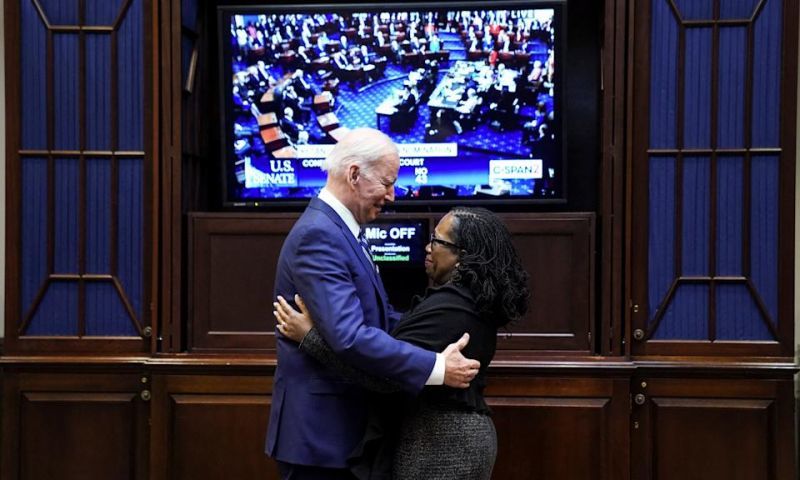
US Senate votes to confirm 1st Black woman to Supreme Court
Overcoming a concerted effort by conservative Republicans to derail her nomination, Judge Jackson was confirmed on a 53-47 vote, with three Republicans joining all 50 Democrats in backing her.
Republicans attempted to smear image of Judge Jackson
According to the New York Times, the vote was a rejection of Republican attempts to paint her as a liberal extremist who has coddled criminals. Dismissing those portrayals as distorted and offensive, Judge Jackson’s backers saw the confirmation as an uplifting occasion, one where a representative of a group often pushed into the background instead moved to the forefront.
The vote put her in line to replace Justice Stephen G. Breyer when he retires at the end of the court’s session this summer.
“Even in the darkest times, there are bright lights,” Senator Chuck Schumer of New York, the majority leader, said on the Senate floor. “Today is one of the brightest lights. Let us hope it’s a metaphor, an indication of many bright lights to come.”
He added, “How many millions of kids in generations past could have benefited from such a role model?” At the Capitol, the galleries to witness the historic vote were packed, with long lines to get in.
 President Joseph R. Biden stands with
Judge Ketanji Brown Jackson as they watch the Senate vote to confirm her
nomination to the Supreme Court from the Roosevelt Room of the White
House on Thursday.
President Joseph R. Biden stands with
Judge Ketanji Brown Jackson as they watch the Senate vote to confirm her
nomination to the Supreme Court from the Roosevelt Room of the White
House on Thursday. One last effort to derail nomination
Senator Mitch McConnell of Kentucky, the minority leader, made one last argument against Judge Jackson’s nomination, framing the nomination as an example of the far left taking control of the Democratic Party.
“When it came to one of the most consequential decisions a president can make, a lifetime appointment to our highest court, the Biden administration let the radicals run the show,” Mr. McConnell said. “The far left got the reckless inflationary spending they wanted. The far left has gotten the insecure border they wanted. And today, the far left will get the Supreme Court justice they wanted.”
Three Republicans — Senators Susan Collins of Maine, Lisa Murkowski of Alaska and Mitt Romney of Utah — crossed party lines to support Judge Jackson, lending a modicum of bipartisanship to an otherwise bitterly polarised process.
Vice President Kamala Harris, the first Black woman to hold the position and one of just 11 Black senators in American history, presided over the vote — one historic figure presiding over the elevation of another — as senators stated their positions from their desks in a reflection of the magnitude of the moment.
Members of the Congressional Black Caucus clustered on the Senate floor to mark the occasion.










